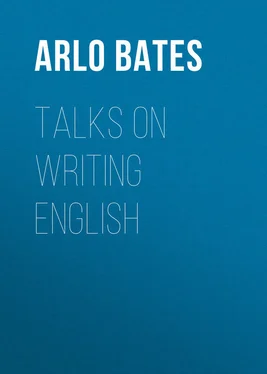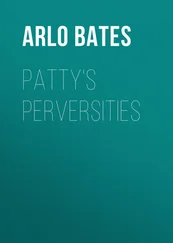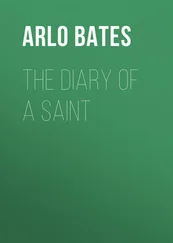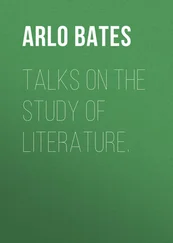Arlo Bates - Talks on Writing English
Здесь есть возможность читать онлайн «Arlo Bates - Talks on Writing English» — ознакомительный отрывок электронной книги совершенно бесплатно, а после прочтения отрывка купить полную версию. В некоторых случаях можно слушать аудио, скачать через торрент в формате fb2 и присутствует краткое содержание. Жанр: foreign_antique, foreign_prose, на английском языке. Описание произведения, (предисловие) а так же отзывы посетителей доступны на портале библиотеки ЛибКат.
- Название:Talks on Writing English
- Автор:
- Жанр:
- Год:неизвестен
- ISBN:нет данных
- Рейтинг книги:5 / 5. Голосов: 1
-
Избранное:Добавить в избранное
- Отзывы:
-
Ваша оценка:
- 100
- 1
- 2
- 3
- 4
- 5
Talks on Writing English: краткое содержание, описание и аннотация
Предлагаем к чтению аннотацию, описание, краткое содержание или предисловие (зависит от того, что написал сам автор книги «Talks on Writing English»). Если вы не нашли необходимую информацию о книге — напишите в комментариях, мы постараемся отыскать её.
Talks on Writing English — читать онлайн ознакомительный отрывок
Ниже представлен текст книги, разбитый по страницам. Система сохранения места последней прочитанной страницы, позволяет с удобством читать онлайн бесплатно книгу «Talks on Writing English», без необходимости каждый раз заново искать на чём Вы остановились. Поставьте закладку, и сможете в любой момент перейти на страницу, на которой закончили чтение.
Интервал:
Закладка:
A violet by a mossy stone,
One of the things which often puzzles beginners is how to increase their vocabulary. Of course reading is one of the most effective means of enlarging one’s knowledge of the language, – but it is only careful reading, reading in which are studied the force and the color of terms as well as their literal meaning, that is of any marked value in this direction. It is said that Thackeray was in the habit of studying the dictionary with a frank purpose of adding to his knowledge of words. I have known two literary men who followed this practice, but they both deliberately selected unusual and bizarre examples with the avowed object of adding a unique and whimsical flavor to their journalistic work. Such an example is of course to be shunned, but in general there is far too little stress laid upon the use of the dictionary. There should be in every preparatory school a regular exercise in the use of the dictionary, and in it all students should be required to join. The teacher should read an extract or a sentence, or should give out words to the class, and have the meanings and derivations actually looked up at the moment. The differing values of synonyms should be examined; and if possible something of the history of the words given. The aim should be to encourage the student in the habit of having a lexicon at hand and of using it constantly.
Another important means of increasing one’s command of language is conversation, and the value of conversation in this respect as in every other is in direct ratio to its character. To talk is not enough; it is necessary that the talker exert himself to do his best. Chatter is of no value as intellectual training; it is the exercise of the mind which tells. The subject of conversation may be as light as possible; but it is important that whatever is said is said well, whether it be a compliment to a mistress’ eyebrow, a discussion of the deepest philosophy of life, or the latest bon-mot of the clubs. “Every variety of gift,” Emerson says truly, – “science, religion, politics, letters, art, prudence, war, or love, – has its vent and exchange in conversation,” and it follows that conversation properly conducted helps to the power of expression in all of these.
Better than all other means of increasing the vocabulary, however, is writing. Always the way to learn to write is to write. The way to increase one’s power of expression is to strive to express. The habit of seeking constantly for the right word results in ability to find the right word. It acts not only directly, widening one’s domain in the realm of language, but it renders a hundred-fold more effective the use of reading and of talk. It puts the mind into an attentive mood so that when a new term is met with it is remembered. The perception on the alert for words becomes susceptible to them, so that they are appreciated and retained. Cultivate the habit of putting things into words and the words will come unconsciously; practice phrasing thought and the means of phrasing it will not long be wanting.
When we go on from the consideration of words to that of sentences we find that here Good Use is more clearly defined. The rules for the construction of sentences are to a large extent more formal than those which govern the choice of terms, and the most obvious of them are conveniently collected and arranged under the name of Grammar.
Grammar is the account-book of custom; it is in reality a reckoning up of the popular suffrages in regard to verbal proprieties. In other words, grammar is the formal statement of the decisions of Good Use in so far as they apply to the relative forms of words. It is of course not necessary to speak here in detail of these. I only wish to call attention to the rules of the grammarian as a particularly well defined example of the supremacy of Good Use in all matters relating to language and its employment in literature. It is because the general consent has decided that a certain form of the verb shall be plural that the grammarian declares it to be in that number. Grammars follow and formulate custom; they neither precede nor dictate.
The inability of the grammarian to dictate to custom is made especially evident when we consider that thing more subtle than syntax and in composition no less important, which we call Idiom. That a writer shall be idiomatic is as essential to writing well as the avoidance of solecisms, yet every student of the language knows how elusive and difficult of attainment is a sound understanding of the idioms of any tongue.
An idiom is the personal – if the word may be allowed – the personal idiosyncrasy of a language. It is a method of speech wherein the genius of the race making the language shows itself as differing from that of all other peoples. What style is to the man that is idiom to the race. It is the crystallization in verbal forms of peculiarities of race temperament – perhaps even of race eccentricities.
It is customary to define an idiom as the form of language which cannot be translated into another tongue; and the example which is commonly given is the habit English-speaking peoples have of saying: “You are right,” whereas the Latin form – literally translated – would be: “You speak rightly,” the French: “You have reason,” and the German: “You have right.” An idiom is independent of grammatical rules, – sometimes is in distinct violation of them. It makes us say: “A ten-foot pole,” “A two-dollar bill,” “A five-acre lot,” – where a plural adjective modifies a singular substantive, or to speak more accurately is compounded with it. It decides that we shall write: “More [friends] than one friend has told me,” – although the subject of “told” is “friends” understood. An idiom boldly ignores the derivation of words. Since “circumstances” means “things standing around,” it is evidently logical to use the phrase, “in these circumstances.” The genius of the language decides that the form shall be, “under these circumstances;” and whoever writes “in” for “under” not only uses unidiomatic English, but lays himself open to the charge of pedantry. Untranslatable and above rules, Idiom is as inviolable as the laws of the Medes and the Persians, and for him who sins against it there is no pardon.
For idioms there is no law save that of Good Use, and perhaps in the discernment of no other rules is required so critical and so nice a discrimination. English which is not idiomatic becomes at once formal and lifeless, as if the tongue were already dead and its remains embalmed in those honorable sepulchres, the philological dictionaries. On the other hand, English which goes too far, and fails of a delicate distinction between what is really and essentially idiomatic and what is colloquial, becomes at once vulgar and utterly wanting in that subtle quality of dignity for which there is no better term than distinction. The grammarian, moreover, wageth against Idiom a warfare as bitter as it is unceasing. It is distinctly idiomatic to use in certain cases what is known as the “flat adverb,” – the adverb in the adjective form without ly . The man who writes “speak loudly,” “speak more loudly,” “speak plainly,” “walk fastly,” “drink deeply,” “speak lowly,” “the moon shines brightly,” “the sun shines hotly,” may have the applause of grammarians and his own misguided conscience, but he is not writing idiomatic English. His virtue must be its own reward, since he can never win the approval of lovers of sound, wholesome, living English. Those who use the language idiomatically write “speak loud,” “speak louder,” “speak plain,” “walk fast,” “drink deep,” “speak low,” “the moon shines bright,” and “the sun shines hot.” Yet these idiomatic distinctions are often very delicate. An adverb is sometimes properly used in its flat form with an imperative when in other cases the form in ly is proper. We say, for instance, “walk slow, walk slower;” but “He walked slowly across the field and more slowly over the bridge.” Nothing but the careful training of the perceptions avails for distinctions such as these.
Читать дальшеИнтервал:
Закладка:
Похожие книги на «Talks on Writing English»
Представляем Вашему вниманию похожие книги на «Talks on Writing English» списком для выбора. Мы отобрали схожую по названию и смыслу литературу в надежде предоставить читателям больше вариантов отыскать новые, интересные, ещё непрочитанные произведения.
Обсуждение, отзывы о книге «Talks on Writing English» и просто собственные мнения читателей. Оставьте ваши комментарии, напишите, что Вы думаете о произведении, его смысле или главных героях. Укажите что конкретно понравилось, а что нет, и почему Вы так считаете.












